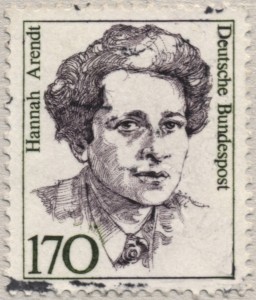 My summer reading fling with Hannah Arendt is showing some signs of making the turn into fall – weather willing. Something I had not seen yet but offer here is from Arendt’s Reflections on Violence from the Feb. 27, 1969 issue of the NYRB. Writes one of the 20th century’s most brilliant thinkers about lessons we refuse to learn:
My summer reading fling with Hannah Arendt is showing some signs of making the turn into fall – weather willing. Something I had not seen yet but offer here is from Arendt’s Reflections on Violence from the Feb. 27, 1969 issue of the NYRB. Writes one of the 20th century’s most brilliant thinkers about lessons we refuse to learn:
No one concerned with history and politics can remain unaware of the enormous role violence has always played in human affairs; and it is at first glance rather surprising that violence has so seldom been singled out for special consideration. This shows to what extent violence and its arbitrary nature were taken for granted and therefore neglected; no one questions or examines what is obvious to all. Whoever looked for some kind of sense in the records of the past was almost bound to look upon violence as a marginal phenomenon. When Clausewitz calls war “the continuation of politics with other means,” or Engels defines violence as the accelerator of economic development, the emphasis is on political or economic continuity, on continuing a process which is determined by what preceded violent action. Hence, students of international relations have held until very recently that “it was a maxim that a military resolution in discord with the deeper cultural sources of national power could not be stable,” or that, in Engels’s words, “wherever the power structure of a country contradicts its economic development” political power with its means of violence will suffer defeat.
Today all these old verities about the relation of war and politics or about violence and power no longer apply. We know that “a few weapons could wipe out all other sources of national power in a few moments,” that biological weapons are devised which would enable “small groups of individuals…to upset the strategic balance” and be cheap enough to be produced by “nations unable to develop nuclear striking forces,” that “within a very few years” robot soldiers will have made “human soldiers completely obsolete,” and that, finally, in conventional warfare the poor countries are much less vulnerable than the great powers precisely because they are “underdeveloped” and because technical superiority can “be much more of a liability than an asset” in guerrilla wars.
What all these very uncomfortable novelties add up to is a reversal in the relationship between power and violence, foreshadowing another reversal in the future relationship between small and great powers. The amount of violence at the disposal of a given country may no longer be a reliable indication of that country’s strength or a reliable guarantee against destruction by a substantially smaller and weaker power. This again bears an ominous similarity to one of the oldest insights of political science, namely that power cannot be measured by wealth, that an abundance of wealth may erode power, that riches are particularly dangerous for the power and well-being of republics.
